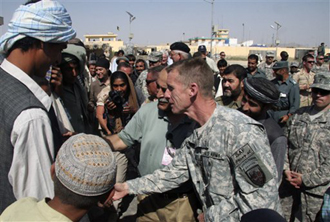| Home | Blog | Ask This | Showcase | Commentary | Comments | About Us | Contributors | Contact Us |

Afghanistan is Obama’s war. What’s he going to do with it?COMMENTARY | July 208, 2009General McChrystal wants far more Afghan security forces than planned so that they can fight their own war. Is that just setting the stage, a la Vietnam, for putting pressure on President Obama to escalate the American troop involvement? By George C. Wilson As your forward observer on things military, I see President Obama being confronted in Afghanistan with the same hard choice that confronted President Richard Nixon in Vietnam: Send in more U. S. troops to pacify the country or hand that tough job over to the natives as you leave the country waving glittering promises.
Nixon opted to leave it to the South Vietnamese government and its army to clean up the mess we made in their country at the same time they had to defend themselves against the widely feared invasion by North Vietnam. Among the glittering promises Nixon waved as he backed out of South Vietnam was the peace treaty Secretary of State Henry Kissinger negotiated in Paris and got signed in 1973.
Congress, thoroughly sick of the Vietnam War and its protesters, heaved a sigh of relief at Nixon’s Vietnamization of the war. The lawmakers went on to deny the South Vietnamese the money they were counting on to buy ammunition and other war gear to combat the North Vietnamese. The North invaded and conquered the South despite the peace treaty, creating a unified Vietnam in 1975.
Before the Vietnam War escalated to where the United States had a half-million troops on the ground in South Vietnam, Secretary of State Dean Rusk told us editors and reporters at The Washington Post that if the United States lost the Vietnam War, “You can kiss Thailand goodbye.”
This was the Kennedy administration’s dead-wrong Domino Theory: Either stop communist North Vietnam or watch other countries in the region fall to the communists.
We were “wrong, terribly wrong” in the way he and other American leaders ran the Vietnam War, the late Defense Secretary Robert McNamara wrote in his 1995 memoir, “In Retrospect: The Tragedy and Lessons of Vietnam.” That war killed about 58,000 American service men and women and, by some estimates, as many as 1 million Vietnamese combatants and 5 million Vietnamese civilians.
U.S. Census Bureau figures testify to the fact that the United States and the still-Communist-but-unified Vietnam have developed a healthy trading relationship since the war ended in 1975. In May 2009, the latest month of trading figures on record, Census reports that the United States sold $248.7 million worth of goods to the new Vietnam and bought $984.1 million from its former enemy. So what was that Vietnam War about anyway?
In Afghanistan today, as in Vietnam yesterday, American military leaders are stressing the need to win the hearts and minds of the people. But as I saw for myself as a combat correspondent in Vietnam in 1968 and 1972, the job of keeping the bad guys out of remote villages day and night — especially at night when it is easy for guerillas to hit and run under the cover of darkness — is a constant, uphill struggle requiring thousands more troops than combat commanders think they can spare for pacification.
This is why the front page, off-lead story in The Washington Post of July 11 rang so true to me. It said Army Gen. Stanley McChrystal, the new field commander in Afghanistan, “has concluded that the Afghan security forces will have to be far larger than currently planned if President Obama’s strategy for winning the war is to succeed … Obama has been cautious about making any additional military resources available beyond the 17,000 [American] combat troops and 4,000 military trainers he agreed to in February. That will bring the total U. S. force to 68,000 [in Afghanistan] by fall.”
The reliability of native forces in Afghanistan is as big a question mark — and probably bigger, given their fractured loyalty to Afghanistan’s central government, tribal and religious leaders and the Taliban — as the one that hung over South Vietnamese troops during the Vietnam War. President Lyndon Johnson opted to fill the yawning troop gap with U.S. forces, increasing their presence in South Vietnam from 16,300 at the end of 1963, the year he took over from the assassinated President Kennedy, to 536,100 at the end of 1968. In the same period, 1963 through 1968, the South Vietnamese armed forces grew from 243,000 to 820,000 combatants. The figures come from the authoritative “Vietnam War Almanac” by Harry G. Summers Jr.
So even with a combined armed force of 1.3 million U.S. and South Vietnamese troops, we could not pacify South Vietnam nor win the war against the North. Afghanistan for centuries has been defeating would-be pacifiers and occupiers. Now Afghanistan is Obama’s war. His plan is to increase the Afghan army from 85,000 to 134,000 by 2011. But McChrystal believes the Afghan army must be much bigger to assure Obama’s success in Afghanistan. But who would an even doubled Afghan army and police force be loyal to? Probably not the Afghan central government.
This sets the stage for McChrystal to ask for more U.S. troops as a quicker, surer fix for pacifying Afghanistan. Obama knows full well that escalating the American presence in Vietnam ruined Johnson’s presidency. He does not want to take “Johnson Avenue” in Afghanistan. He doesn’t want to lose his first war, either. The struggle for the president’s mind on Afghanistan is under way.
This column first appeared in National Journal’s CongressDaily.com
|
||||||||||||




